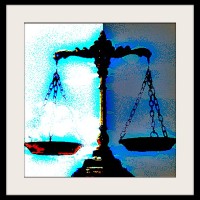 Step into any courtroom in the United States and you will be brought to attention with two simple words:
Step into any courtroom in the United States and you will be brought to attention with two simple words:
All Rise!
The court officer loudly proclaims it as the judge comes in and we all stand aware of the role of the court in our system of justice.
“All Rise” implies several things. First, it’s the honor due those who judge us but with that honor also comes an expectation that, in the US at least, the law will be fairly applied and our country and its Constitution will be upheld and preserved.
I wasn’t exactly sure why people say “All Rise” so I looked it up and many lawyers point to our judicial system as English in its derivation, with a time when nobility presided as magistrates, and even today, the Bible is brought in. A Bible on which someone places his hand (typically the witness but occasionally the clerk) and the witness takes an oath before God and court to tell the truth, the whole truth, and nothing but the truth as sworn testimony.
The lawyers are not held to such a standard. They may select partial truth to place their client’s actions in the best light.
It’s really rather interesting that in modern America, the national pastime may very well be resisting arrest, if viral videos are any indications.
And yet, the very same person refusing to rise in the classroom or the street for law enforcement officers will probably still comply with the “All Rise” in court. Why? The judge can decide your fate of freedom or incarceration.
According to Jacob A. Stein from Washington Lawyer, January 2013, there is an internal conversation that goes on beyond what the judge says to the jury.
The Judge to the Jury: In reaching your decision, it is for you to decide which witnesses were truthful and which may be untruthful. You must take into consideration the way a witness appeared on the witness stand and how he testified. Use your common sense and experience in making the evaluation.
All the while,
The Judge to Himself: I myself cannot tell, just by looking at a witness and the way he talks, whether or not he is truthful. Studies have been conducted about the way a person speaks and acts on the witness stand. These studies report that humans are not good lie detectors. Common sense, what does that mean? Any more than what reasonable doubt means?
As I watch a witness, I am convinced that the oath does mean something. The raising of one hand, and the other hand on the Bible, has an effect. How much, however, is not clear.
In today’s culture, I find that particularly conversation of the conscience disconcerting. As our nation careens from one lawlessness act to the next, from a nation of laws based on the Bible to one that rejects the Bible, I wonder as that judge says to himself what an oath actually means if one doesn’t believe in God.
Well, Paul believes in God and he would appear in court today and he will rise to stand before Governor Felix who is judging his case. God is his witness and Paul will tell the truth, the whole truth, and nothing but the truth.
His accusers take their false accusations so seriously and want Paul to pay so badly that the high priest himself will come down to Caesarea to confront Paul. Of course, the high priest and the Sanhedrin will hire a fancy lawyer who gives an ancient footing to the W.C. Fields quote
If you can’t dazzle them with brilliance, then baffle them with bull.”
Acts 24:1 Five days later the high priest Ananias went down to Caesarea with some of the elders and a lawyer named Tertullus, and they brought their charges against Paul before the governor. 2 When Paul was called in, Tertullus presented his case before Felix:
“We have enjoyed a long period of peace under you, and your foresight has brought about reforms in this nation. 3 Everywhere and in every way, most excellent Felix, we acknowledge this with profound gratitude. 4 But in order not to weary you further, I would request that you be kind enough to hear us briefly.
Yada yada yada. Buttering Felix up with all kinds of fancy words before presenting the charges:
5 “We have found this man to be a troublemaker, stirring up riots among the Jews all over the world. He is a ringleader of the Nazarene sect 6 and even tried to desecrate the temple; so we seized him. 78 By examining him yourself you will be able to learn the truth about all these charges we are bringing against him.”
9 The Jews joined in the accusation, asserting that these things were true.
Basically 4 charges against Paul:
- He’s a troublemaker, fomenting riots.
- He’s a ringleader of a religious sect
- He’s a Nazarene
- He desecrated the temple.
Of those 4, only one is a real problem as far as Felix might be concerned—that of being a troublemaker and causing riots. After all, the “long period of peace” and the foresight and reforms had actually been Felix’s brutal stamping out of varied insurrections. Flattery aside, there’s subtle hint from Tertullus that Paul was just like that Egyptian ringleader who caused an earlier uprising (the same Egyptian the commander had in mind when he was surprised that Paul speaks Greek and is a Roman citizen). Anyway, the lawyer was all about poisoning the water hole in the mind of Felix regarding the situation before Paul even says a word in his own defense.
10 When the governor motioned for him to speak, Paul replied [minus all that fluff and flattery]:
“I know that for a number of years you have been a judge over this nation; so I gladly make my defense.
Paul states the truth, the whole truth, and nothing but the truth.
Fact:>> 11 You can easily verify that no more than twelve days ago I went up to Jerusalem to worship.
Fact:>> 12 My accusers did not find me arguing with anyone at the temple, or stirring up a crowd in the synagogues or anywhere else in the city.
Fact:>> 13 And they cannot prove to you the charges they are now making against me.
But Fact:>> 14 However, I admit that I worship the God of our fathers as a follower of the Way, which they call a sect. I believe everything that agrees with the Law and that is written in the Prophets, 15 and I have the same hope in God as these men,
And then Paul returns to his testimony here as he did before the Sanhedrin, agreeing with the Pharisees in the group of accusers that there will be a resurrection
And we see something interesting now in Paul’s theology. He says more than there will be a resurrection. Now it’s a resurrection of both the righteous and the wicked. 16 So I strive always to keep my conscience clear before God and man.
Up until now, Paul has only spoken of the resurrection as related to Jesus and the righteous, but now he’s explicitly looking forward to a day when there will be an All Rise to stand before the Judge at the end of time. ALL! Both the righteous and the wicked will have to make an account of their lives before God. Paul’s conscience is clear. One can only wonder if the words “the wicked” gave Tertullus or the Sanhedrin or the high priest or Felix a moment’s pause to consider whether they were among God’s righteous ones…or casting their lots among the wicked.
Paul continues his defense:
17 “After an absence of several years, I came to Jerusalem to bring my people gifts for the poor and to present offerings. 18 I was ceremonially clean when they found me in the temple courts doing this. There was no crowd with me, nor was I involved in any disturbance. 19 But there are some Jews from the province of Asia, who ought to be here before you and bring charges if they have anything against me. 20 Or these who are here should state what crime they found in me when I stood before the Sanhedrin– 21 unless it was this one thing I shouted as I stood in their presence: ‘It is concerning the resurrection of the dead that I am on trial before you today.'”
He says he’d been gone for years, coming back only 12 days ago. How could he possibly be implicated in a riot when he was nowhere nearby? How could he desecrate the temple when he was ceremonially clean himself and there was no crowd with him, no Trophimus the Ephesian, for example? The Nazarene “sect” as Tertullus called it was really no different in principle than the Pharisee or Sadducee sects which were completely allowed by the Romans. He wasn’t involved in any disturbance there in Jerusalem, however there might be some Jews from Asia who could bring charges of riots—like in Ephesus with the “Great is Artemis of the Ephesians” crowd– if they have anything against him. But they’re not there. They haven’t pressed charges.
Those present before Felix with their fancy lawyer still haven’t stated what crime caused him to stand before the Sanhedrin at the very beginning… 21 unless it was this one thing I shouted as I stood in their presence: ‘It is concerning the resurrection of the dead that I am on trial before you today.'”
Here he goes again, talking about the Resurrection!
 Ya gotta understand something about Paul. On the road to Damascus, Jesus totally blew his mind and scared the living daylights out of him.
Ya gotta understand something about Paul. On the road to Damascus, Jesus totally blew his mind and scared the living daylights out of him.
Paul was face-to-face with the Messiah….with the Son of God…face-to-face with God Himself which meant certain death in OT times, but Jesus is Emmanuel, God with us! Paul, for all his intellect…for all his zeal…for all his legal training…for his pedigree and political connections…it meant nothing! He had a wakeup call to beat all wakeup calls. He was exposed as a sinner and mercifully also as a recipient of grace. He knew it for a fact because of the Resurrection! There was no going back after acknowledging the truth of the Resurrection of Christ.
But resurrection was just one group’s religious doctrine and not a crime against Rome. Felix, at this point, ought to have released Paul, but he didn’t want to invite trouble with the Jews so he delays, waiting for the commander Claudius Lysias to show up and settle the question of Paul’s guilt or innocence which reminds me of another W.C. Fields quote:
The world is getting to be such a dangerous place, a man is lucky to get out of it alive.”
Paul knew how to get out of this life alive. Yeah. Resurrection. The Way, the Truth, and the Life. And he’s pointing everyone to the Way.
22 Then Felix, who was well acquainted with the Way, adjourned the proceedings. “When Lysias the commander comes,” he said, “I will decide your case.”
Paul makes a very competent defense of himself and his actions, in fact, dancing circles around even a professional lawyer—which points back to what Jesus said He’d do when His witnesses would be called to testify to the Gospel. At the All Rise of court, God would give words to say that would testify to the Gospel of our Risen Lord. Paul was not on his own. God was pleading Christ’s case through Paul.
A good spokesman for God needs both character and words. Paul was blameless. His words were God’s. Without Paul’s integrity, God’s words would have been muddied. Paul was a good witness for Christ, watching (as he’d later tell Timothy) 1 Timothy 4:16 Watch your life and doctrine closely. Persevere in them, because if you do, you will save both yourself and your hearers.
Purity before numbers. Purity, blamelessness, a clear conscience before the Lord is foundational to effective witness and Kingdom growth. Felix, our Scriptures say, was well acquainted with the Way. He wasn’t convinced by it, but acquainted with it. Which brings up our take-home messages for today:
First at the All Rise at the end of time, the resurrection of both the righteous and the wicked, which group will you be in?
We will All Rise…all stand… before the Judge and make a defense of our lives. For the righteous, we have nothing to show but the blood of Christ covering ourselves and Jesus Himself to plead our case. And it’s enough for eternal life. The blood of Christ is fully sufficient to make peace for us with a holy God. For the wicked though, those who refused what God provided for them, they’ll stand there like Tertullus with all kinds of flattery and fluff perhaps, but in the end, their arguments will melt away because God knows the truth, the whole truth, and nothing but the truth of our lives.
Rejecting the blood of Christ is a capital offense.
At the All Rise, one either has the blood of Christ to plead for them and eternal life to gain…OR one is left among the wicked and will be resurrected only to find an endless dying which is what hell is.
If you have never received Christ as your Lord and Savior, really, seriously, there is no time like now. You don’t want to hear All Rise without Jesus to plead your case.
It’s simple: just acknowledge to Him what He already knows: you’re a sinner. Tell Him you’re sorry about that. Ask Him to cover your sins with His shed blood…like we remember today with Communion. There’s a new covenant in His blood and His blood was shed for you! Don’t let today go by without having Christ to plead your case at the All Rise at the end of time.
The second take home message is about the testimony of your life. The Christian church is replete…overflowing…with people whose character is shameful and immoral.
Leaders are chronically falling from grace, disappointing—even deceiving their followers, and propelling people to reject Christ because they reject the self-proclaimed Christian leader who lived as a fraud. This must not be!!
If you’re gonna claim to be a Christian…whether as the President of the United States, president of junior women’s league, presiding over the Supreme Court, or presiding over your one room apartment, your life needs to reflect what you claim. Lies have no place for the Christian. Deception has no place in the Christian’s life. Immorality behind closed doors is still revealed in the Christian life by God who already knows the truth, the whole truth, and nothing but the truth and no man can hide it forever. Dennis Hastert, former Speaker of the House, knows the truth of Ephesians 5:11 Have nothing to do with the fruitless deeds of darkness, but rather expose them. 12 For it is shameful even to mention what the disobedient do in secret. 13 But everything exposed by the light becomes visible, 14 for it is light that makes everything visible. This is why it is said: “Wake up, O sleeper, rise from the dead, and Christ will shine on you.” 15 Be very careful, then, how you live– not as unwise but as wise, 16 making the most of every opportunity, because the days are evil. 17 Therefore do not be foolish, but understand what the Lord’s will is.”
Let’s face it, whether it is exposed in your lifetime or after your death…at the All Rise, the Judge who has known the truth all along will see to it that eventually everyone else will too. It will be evident in the Guilty verdict and the sentence to be served.
 Ah, but for the Christian, God’s wrath was already poured out on Jesus. Paid in full.
Ah, but for the Christian, God’s wrath was already poured out on Jesus. Paid in full.
Isn’t it better to confess and be forgiven? Isn’t it better to live as one who has received the forgiveness of Christ? All of us will be exposed as sinners, but some of us will have branded on our hearts one word:
FORGIVEN.
So, when people read the only Bible they may ever see…the life of you as a self-proclaimed Christian…will they see someone who tries to be blameless?
The days are evil so it’s not enough to outwit our accusers. We must outlive them. Not in years perhaps but in character, integrity, and purity…watching our lives and our doctrine closely. What is the testimony your life tells?
Paul would write to Timothy: 1 Timothy 1:15 Here is a trustworthy saying that deserves full acceptance: Christ Jesus came into the world to save sinners– of whom I am the worst. Paul today stood before Felix with a clear conscience. All Rise before an earthly judge. But Paul knew there’s a greater judgment to come. Because Paul knew and understood the power of the Resurrection and the power of a blameless life, and the power of God to wash away sin with the blood of Christ, Paul witnessed to and suffered for the Gospel…just as Jesus said he would. Let’s pray.
 Last week, Paul was standing trial and he was the only witness stepping forward. He talks about having done his duty to God and gets in big trouble with the high priest. We observed that sometimes there’s more going on than meets the eye.
Last week, Paul was standing trial and he was the only witness stepping forward. He talks about having done his duty to God and gets in big trouble with the high priest. We observed that sometimes there’s more going on than meets the eye. How did Paul turn this and a retelling of his conversion story… into standing trial because of his hope in the resurrection of the dead? Is he just spinning a new narrative? You may remember from last week, I said that Paul was witnessing to more than just doing his duty to God by preaching to the Gentiles. Not a new narrative at all! It was WHAT he was preaching to all men everywhere. It was the Gospel revealed to Paul by the Risen Lord himself that Paul was teaching. We can see that was Paul’s mindset all along.
How did Paul turn this and a retelling of his conversion story… into standing trial because of his hope in the resurrection of the dead? Is he just spinning a new narrative? You may remember from last week, I said that Paul was witnessing to more than just doing his duty to God by preaching to the Gentiles. Not a new narrative at all! It was WHAT he was preaching to all men everywhere. It was the Gospel revealed to Paul by the Risen Lord himself that Paul was teaching. We can see that was Paul’s mindset all along. If there’s one big lesson from today’s message it would be this: Be prepared so that when God asks you “Can I get a witness?” your answer can be a resounding “Yes”!
If there’s one big lesson from today’s message it would be this: Be prepared so that when God asks you “Can I get a witness?” your answer can be a resounding “Yes”! When I first organized this sermon series, I was worried there wasn’t going to be much to build a sermon on. But as I began to research it, I discovered there’s a lot here. And many commentators and theologians say that what just happened was that Paul, stressed out from nearly being torn to pieces by the crowd and put in jail, nearly flogged, and then forced to testify against himself before the Sanhedrin…well, he loses his cool and shows a “rare display” of his sinful humanity.
When I first organized this sermon series, I was worried there wasn’t going to be much to build a sermon on. But as I began to research it, I discovered there’s a lot here. And many commentators and theologians say that what just happened was that Paul, stressed out from nearly being torn to pieces by the crowd and put in jail, nearly flogged, and then forced to testify against himself before the Sanhedrin…well, he loses his cool and shows a “rare display” of his sinful humanity. We cannot rely on one verse alone, but must consider Scripture as a whole in all its detail.
We cannot rely on one verse alone, but must consider Scripture as a whole in all its detail.  Paul was a witness to his knowledge of the history of Judaism
Paul was a witness to his knowledge of the history of Judaism He was thoroughly trained as a witness to the Law.
He was thoroughly trained as a witness to the Law.  And finally, Paul was a witness to his times.
And finally, Paul was a witness to his times.
